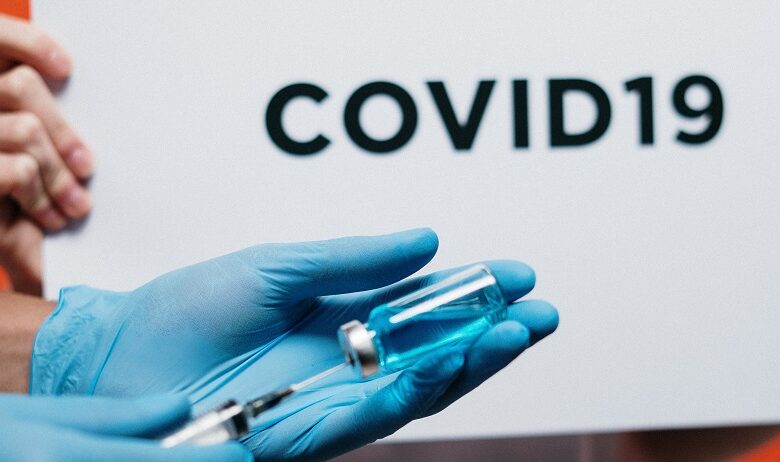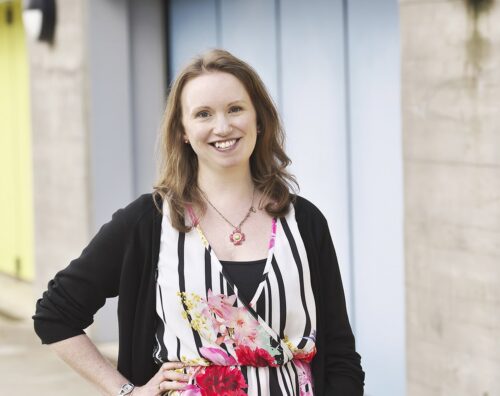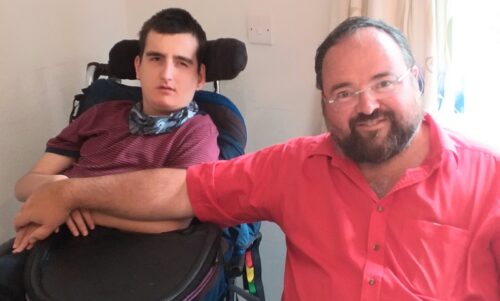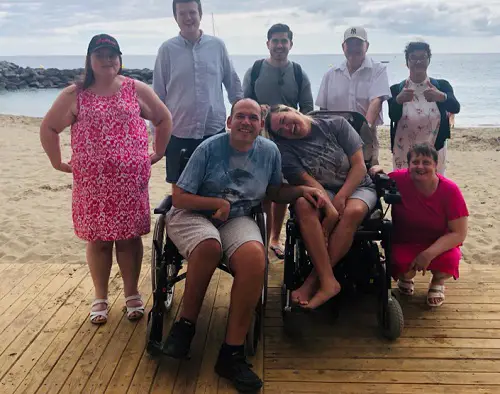
Disabled people and carer’s experiences of accessing the coronavirus vaccine
This is an updated post from our archives. It explores the experiences of disabled individuals and their carers in accessing the Covid-19 vaccine in the UK, highlighting both successes and challenges encountered during the vaccination process.
Recent Developments in Vaccine Accessibility for Disabled Individuals and Carers
Since the initial rollout, there have been significant improvements in vaccine accessibility:
- Mobile Vaccination Units: To reach those with mobility challenges, NHS England has deployed mobile units to provide vaccines directly in communities.
- In-Home Vaccinations: For individuals unable to travel, local health services offer in-home vaccination appointments, ensuring everyone has access.
- Priority Booking Systems: Dedicated booking lines and online systems have been established for disabled individuals and carers, reducing wait times and simplifying the appointment process.
- Accessible Information: Vaccine information is now available in various formats, including braille, large print, and easy-read versions, catering to diverse needs.
For more details on these services, visit the Department of Health and Social Care website.
The coronavirus vaccine programme has been in action across the UK since December 2020 and more than 10 million people have received their first dose so far.
With the first four priority groups being given the vaccine, we ask disabled people, those with health conditions and carer’s thoughts and experiences of accessing the Covid-19 vaccine.
Covid-19 vaccine schedule
Since 8th December 2020, two coronavirus vaccines – Pfizer/BioNTech and Oxford/AstraZeneca – have been approved and administered to patients across the UK.
As of 3rd February 2021, a total of 10,021,471 people had received their first dose of a vaccine, and more than 470,000 people have had a second.
These people are from the four top priority groups:
- residents in a care home for older adults and their carers
- all those 80 years of age and over and frontline health and social care workers
- all those 75 years of age and over
- all those 70 years of age and over and ‘clinically extremely vulnerable’ individuals
On Monday 1st February 2021, the government announced that it has met its target to offer the vaccine to all older residents in eligible care homes in England. However, not all care staff in the homes have been offered the jab yet.
The process for rolling out the vaccines to people over 70 and those ‘clinically extremely vulnerable’ started on 18th January 2021.
The government aims to offer the first dose of vaccines to 15 million people – those aged 70 and over, healthcare workers and people required to shield – by mid-February and millions more people aged 50 and over and other priority groups by May.
For further details on the types of vaccine, side effects, vaccinations centres and the full priority list, visit our detailed guide – Covid-19 vaccines: how they work and who is eligible if you have a disability or chronic illness.
Disabled people and carer’s access to the coronavirus vaccine
With the coronavirus vaccine programme in full swing, and many of our community within the top priority groups, we wanted to find out people’s thoughts and experiences of accessing the vaccine.
Many of you tell us you’ve successfully received your first dose of a coronavirus vaccine, some of you are definitely in the priority groups and are still awaiting an appointment, while many more of you are uncertain as to if and when you’ll be eligible for the vaccine.
Excellent service and easy access to vaccination centre

Nick Ireland is in his 80s and classed as ‘vulnerable’ because he has cancer and a compromised immune system. He was part of the second priority group.
In January, Nick received a letter asking him to attend an appointment on Tuesday 19th. For it, he drove himself to a leisure centre 11 miles from his home. He said the service was “excellent” and he was “seen on time”.
He was given the Pfizer vaccine, did not recall being asked any questions before the jab and he experienced no side effects.
He told us: “I have had my first Covid-19 jab and have got a time and date for my second jab in 12-weeks. The card also records what vaccine make and batch number I had.”
Booked vaccines for key workers without detailed evidence of employment

News Editor Emma Purcell‘s parents recently received the vaccine. Emma’s mum Carol, who is 52, currently works as a live-in carer on a fortnightly basis at Emma’s home. Emma’s dad Chris, who is 61 and also in Emma’s support bubble, works as a wheelchair engineer.
Because of their work, Carol and Chris called up their GP, explained that they are key workers and asked if they could have the vaccine. The receptionist immediately said yes without any further questions and put on the priority list. Not long after, they received their appointment on 22nd January.
On the day of the vaccine, they had to go to a local theatre seven miles north from their home. They were given the Oxford vaccine, weren’t asked any additional questions or evidence of their employment and were in and out within minutes.
The only downside was they both experienced quite moderate side effects, including muscle pain all over their bodies, sickness and a headache. Fortunately, the side effects subsided within 48 hours.

Emma said: “I was so surprised my parents got vaccinated so soon. I was expecting that they would have to wait for the over 60s and 50s priority list or phase 2 of key workers. My only concern with the vaccination staff not checking their employment status is that anybody could ring up and say they’re a key worker.”
“As for me getting the jab (I have cerebral palsy), I’m not sure which priority group I’m in. Because I get the flu jab every year, I’m assuming I’ll be in the category of over 16s with underlying health conditions. So, as soon as that group begins being offered the vaccine, I’ll contact my GP to see if I’m eligible.”
The priority lists appear more like a postcode lottery

Our CEO and Editor-in-Chief Liz Ransome-Croker, who has a heart condition, was initially uncertain as to which priority list group she would be in for the vaccine as she didn’t receive another shielding letter at the start of the third lockdown, despite having one at the first.
However, after contacting the hospital, she was told she is in the ‘clinically extremely vulnerable’ group and therefore should receive an invitation to be vaccinated soon.
In the meantime, arguably ‘healthier’ family members have had their jab before those who are more ‘vulnerable’.
She said: “Interestingly, out of me, my parents and my husband’s parents, my dad – who is over 70 and has diabetes and heart trouble – and I should technically have been first. But my husband’s dad, who is just 70 with no underlying conditions, got it today last week.
Thankfully, my parents have just heard they are getting theirs next week, but I still haven’t heard anything about me. We all live in different counties, so it shows how where you live can make a real difference. It depends on the facilities available and which type of vaccine they’re having to store and administer – some are much harder than others.”
Update 09/02/2021: Liz is now having her first vaccine dose this Friday (12th). She said: “I was put off calling my GP because I know how stretched everyone is, but considering the Government’s aim is to vaccinate the top four groups by the middle of February, I was concerned that I hadn’t heard anything.
It’s a good job I called as I had been missed off the list. Thankfully, the person I spoke to was very helpful and could see I clearly fit into the category. I’m really relieved.”
If you’re worried, do contact your GP, clinician or healthcare provider to check the status.
Mother’s concerns over if and when ‘vulnerable’ daughter can be vaccinated

Lorna Fillingham’s 10-year-old daughter Emily-May has an ultra-rare genetic condition that means she has severe learning and physical disabilities and is classed as ‘clinically extremely vulnerable’.
Lorna and Emily-May have been shielding since the first lockdown and Emily-May has not returned to school since the start of the pandemic. Lorna is concerned as she does not know if and when her daughter will get vaccinated because it has not been tested on children.
Lorna said: “I haven’t contacted her GP about the vaccine as I know that it still hasn’t been tested fully in children yet. We are happy to wait as we are as safe as we can be at the minute.
As soon as the vaccine is available to children, I would certainly look at all the information and make an informed decision at the time. Currently, it feels like it might be our only way back to some sort of normality.”
Lorna feels that ‘clinically extremely vulnerable’ children have been forgotten throughout this pandemic.
She added: “I think the current narrative in the media is that all ‘clinically extremely vulnerable’ will be vaccinated this year.
However, there is little to no mention that this probably won’t be the case for children in this group. Therefore, I suspect may families with a ‘vulnerable’ child will have done the same as us and continued to shield throughout.”
Disabled teenage son successfully receives coronavirus vaccine

Joe Edwards, who is 16 and son of our shop manager Duncan Edwards, successfully received the Pfizer vaccine on 2nd February.
Joe has Dravet Syndrome, impaired breathing because of scoliosis, severe epilepsy, visual impairment, learning disability and global developmental delay. Joe attends a special educational needs school and it was the school that advised him how to access a vaccine.
Duncan said: “His teacher phones each week and she mentioned that she had seen a link on Facebook for ‘clinically extremely vulnerable’ people to book appointments if they had not heard from their GPs.”
“She sent the link and I had to register in Joe’s name on swiftqueue.com with his NHS number. The link appeared to be mostly aimed at care workers as it required employment details, so I just added “patient” in each box.
I had to provide a photo ID, which we don’t have for Joe as he has no passport or driving license, so I quickly signed up for the Access Card. I also had to take his letter stating he is ‘clinically extremely vulnerable’ and his NHS number.”
If you need an Access Card to use as a form of ID, you can buy one through our shop at a discounted rate.
Duncan also explained the experience of receiving the coronavirus vaccine.
“The vaccination took place at the restaurant of the Leicester Royal infirmary. There was actually a choice of venues – other Leicester Hospitals and an NHS centre in Leicester. I chose the restaurant because it is on the ground floor and I wanted to avoid lifts.
We arrived at 2.30pm for the 2.40pm appointment but I was a bit overwhelmed by the queue, which snaked on and on down corridors and deep into the hospital!
They were running 30 minutes late and I was worried that Joe was without a mask in a confined space (he is mask exempt due to breathing issues). Thankfully, we were moved up the queue, but we still had a wait of around 30 minutes.
I think they could have prioritised ‘clinically extremely vulnerable’ people and bumped them to the front. There was another lady with a crutch who was exhausted as there were no seats.
“It is impossible to know absolutely because of hidden disability, but it seemed to me that 90% of the people in the queue were NHS workers or care staff, who are more likely to actually have Covid-19 than those who have been shielding.
Joe had the Pfizer vaccine, but there were different vaccines at different locations. After I booked, I had to check that I had booked the correct one myself as I believe only Pfizer is ok for under 18s.”
So far, Joe has had no side effects and once fully vaccinated, he is looking forward to returning to school and being able to access respite, cinema trips and days out.
Disabled people have continued to be behind in the vaccination roll-out plans

Angus Drummond, who has Muscular Dystrophy, is the founder and CEO of the tour company Limitless Travel, in which its mission is to reduce social isolation within the disabled travel community.
Over the past five years, the company has been fulfilling this goal by running supported group holidays and tours to fully accessible locations in the UK, Europe and beyond.
Angus shares his thoughts on the roll-out of the coronavirus vaccine and how he thinks the government is not doing enough to include disabled people in the plans, or keep them informed.
“When the government released its initial Covid vaccine schedule, it highlighted the need to provide vaccines for those in higher age groups as a priority. However, there was no mention of any specific provisions for disabled people within these plans initially.
The information was only added to the updated guidance in December 2020, with people with disabilities now being accounted for within the lower third of the nine priority stages.

As time goes on, and as a member of this community myself, I am increasingly wary that whilst news of the vaccine and its distribution is extremely promising, people with disabilities have continued to be behind in the vaccination roll-out plans and should be provided with clearer guidance on their level of priority.
For many of us, myself included, there remains an uncertain wait until our call-up, which will undoubtedly have a continued negative effect upon many disabled people and their mental health.
Many of us are still awaiting confirmation on our proposed vaccination dates so that we can make plans not only for the next year, but even for the next few months.
In many ways, we are all waiting to receive our ‘golden ticket’, offering a much-needed light at the end of the tunnel, and clarification on this timeframe would be integral to regaining confidence after what has been a very uncertain year.”
What are your thoughts on the coronavirus vaccines roll out? Have you had your first dose yet or are you still awaiting an appointment or eligibility? Share your experiences on Facebook and Twitter @Dhorizons.
By Disability Horizons
More on Disability Horizons…
- Why journaling could help you cope with Covid-19
- Shielding stories: the impact on disabled people’s mental health
- 58% of disabled and chronically ill people feel anxious about the easing of lockdown rules
- Face mask exemptions: how to ensure you don’t get fined if you’re exempt
Originally posted on 06/02/2021 @ 9:00 am